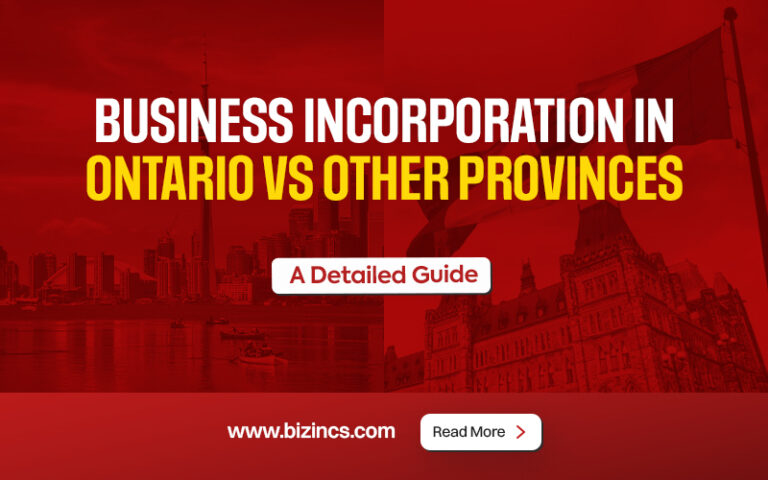What Legal Documents You Actually Need After Incorporating in Ontario
When completing business incorporation in Ontario, many entrepreneurs assume the process ends.
But registering your company with the Ontario Business Registry is just the beginning.
A fully compliant corporation must maintain and manage several essential legal documents.
Without them, your company risks legal issues, fines, and future operational problems.
This article will walk you through each document required after incorporation.
Understanding what you need helps you remain compliant and legally protected.
Let’s dive into the critical documents post-business incorporation in Ontario.
1. Articles of Incorporation
Your Articles of Incorporation are your company’s birth certificate and foundation. Filed with the Ontario Business Registry, this document creates your corporation. It includes details like company name, structure, address, and share structure.
You must keep a copy in your corporate records for legal reference. This is a vital document for ownership, taxation, and shareholder structure purposes.
2. Corporate By-laws
Corporate by-laws are internal rules that govern your corporation’s day-to-day activities. They outline how directors are elected, meetings conducted, and shares handled. Though not filed with the government, they’re legally necessary for smooth governance.
Your by-laws ensure your business decisions follow consistent and formalized procedures. These are essential for resolving internal disputes or future regulatory challenges.
3. First Directors’ Resolution
Once incorporated, your first board of directors must pass a resolution. This resolution establishes the operational framework of your newly formed corporation. It includes appointing officers, issuing shares, and adopting your corporate by-laws.
Without this, you lack formal documentation of leadership and governance structure. It’s a key part of setting your business up for long-term success.
4. Shareholder Agreement (If Multiple Shareholders)
If your company has more than one shareholder, this document is essential. A Shareholder Agreement outlines ownership rights, responsibilities, and share transfer procedures.
It prevents future conflicts between business partners by clarifying each person’s stake. This legal contract offers protection in case of death, sale, or dispute. Without it, disputes can damage the company’s operation and shareholder trust.
5. Share Certificates
Each shareholder in your business must receive a Share Certificate. This official document proves how many shares each person holds. You’ll also need to keep a Share Register in your minute book.
These documents are required during audits, investment deals, or selling your business. Always update certificates when issuing or transferring shares between stakeholders.
6. Minute Book (Corporate Records Book)
Your Minute Book contains all official records of your corporation’s activities. This includes meeting minutes, resolutions, share certificates, and director registers.
Keeping it updated and organized is a legal requirement in Ontario. Many businesses fail to maintain this, risking non-compliance and operational confusion. You can maintain it physically or digitally, but it must always be accessible.
7. Register of Directors, Officers, and Shareholders
Under Ontario business laws, you must maintain accurate and current registers. These include details of directors, officers, and shareholders of the corporation. This information supports your legitimacy in government filings and banking operations.
Any changes must be updated immediately to stay compliant with legal requirements. Incorrect registers may delay funding, licensing, or third-party verification processes.
8. Annual Resolutions and Meeting Minutes
Every year, your corporation must hold a shareholders’ and directors’ meeting. You must record minutes and document all major decisions and discussions. Alternatively, written resolutions signed by all parties are legally acceptable.
These documents demonstrate that your corporation is actively governed and functional. Neglecting this can be considered a failure to operate legally in Ontario.
9. Business Licences and Permits (Based on Activity Type)
Incorporation doesn’t give you a license to operate in every industry. Depending on your sector, additional business licenses and permits may apply. Examples include food handling, transportation, daycare, and online retail operations.
Check with local, provincial, and federal authorities to ensure full compliance. Failing to do so invites fines, shutdowns, and reputation damage to your brand.
10. CRA Business Number and Tax Accounts
Once registered, apply for a CRA Business Number to operate legally in Canada. This number is needed for payroll, import/export, HST, and corporate tax filings. The CRA also issues program accounts for GST/HST and payroll taxes.
Failing to register can result in tax penalties or blocked government interactions. You can apply online or through a tax professional for timely registration.
11. WSIB Registration (If You Employ Staff)
If you plan to hire employees, register with the Workplace Safety and Insurance Board (WSIB).
It provides insurance coverage and workplace protection for your workers. In Ontario, most industries are mandated to enroll and remit premiums. You’ll also need to display your WSIB clearance certificate when requested.
Failing to register could result in significant penalties and legal liability.
12. Banking Resolution Document
To open a business account, most banks require a Banking Resolution. This document authorizes specific individuals to access and manage the account. It is usually adopted during the first directors’ meeting or organizational resolution.
Without it, you can’t prove your authority to open or control finances. Banks may freeze funds if proper documentation is not shown on request.
13. Proof of Registered Office Address
The Ontario Business Registry requires your business to list a valid address. You must provide proof of this address during or after incorporation. This cannot be a PO box, it must be a physical location in Ontario.
This address will receive legal documents, so accuracy is critical. Incorrect information can lead to missed notices or legal non-compliance.
14. Employment Agreements and Contractor Contracts
If you hire employees or freelancers, draft clear legal agreements for them. Employment agreements outline responsibilities, compensation, and termination procedures. These documents protect your business from future employment-related legal claims.
For freelancers, a contractor agreement prevents misclassification and tax complications. Ensure each document meets Ontario’s Employment Standards Act (ESA) requirements.
15. Intellectual Property Assignments and Trademark Documents
Protect your business name, logo, or unique product with proper IP registration.
Trademark registration in Canada helps guard your brand against infringement.
If employees or contractors create IP, secure ownership through assignment agreements.
Lack of IP documentation can cost you valuable assets during disputes or exit.
Register your trademark early with the Canadian Intellectual Property Office (CIPO).
16. Data Privacy and Consent Documents (For Online Businesses)
If you collect user data, you must have privacy and consent policies.
Canada’s PIPEDA law requires businesses to protect user data transparently.
Include these policies on your website to remain compliant and build trust.
You’ll also need cookie consent tools for website tracking and analytics.
Neglecting these may result in fines or banned website operations in Canada.
17. Business Insurance Documents
Most banks, partners, or landlords will ask for proof of insurance.
Typical coverages include liability, property, cyber, and errors & omissions insurance.
Each policy must be suited to your specific business risk exposure.
Keeping updated policy documents can protect your business from major financial losses.
Review policies yearly to ensure compliance with Ontario business insurance regulations.
18. Corporate Seal and Incorporation Kit (Optional but Useful)
While no longer mandatory, a Corporate Seal adds authenticity to documents.
Your incorporation kit contains templates, share certificates, and your Minute Book.
Many professional services offer digital kits for convenience and legal use.
Using these tools helps maintain a professional and compliant business image.
They’re useful during notarization or high-level business negotiations and transactions.
Final Thoughts: Don’t Just Incorporate, Stay Compliant
Registering your company with the Ontario Business Registry is step one only.
Ongoing legal compliance requires maintaining every document listed in this article.
These documents safeguard your business from audits, lawsuits, and future complications.
Work with legal or accounting professionals to ensure your paperwork stays current.
Business incorporation in Ontario is only successful when followed by proper governance.
Staying organized, legally protected, and informed is your key to long-term success.
For peace of mind, invest time into creating and maintaining these documents.
Whether you’re launching a tech startup or retail store, these rules apply.
Avoid shortcuts, what you skip now might cost you big in future.
The right foundation today will power your growth and protect your brand tomorrow.
Need Help? Consider professional help when navigating post-incorporation compliance in Ontario.
It’s worth the investment to secure your business from legal and financial risk.







